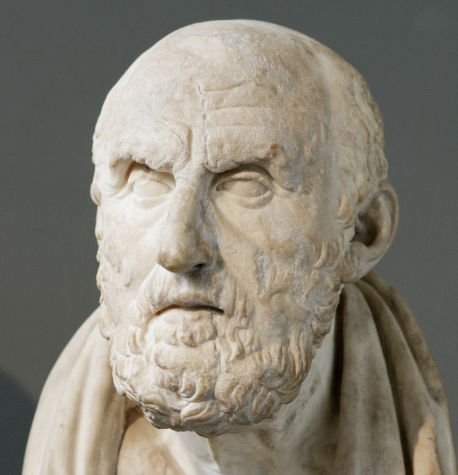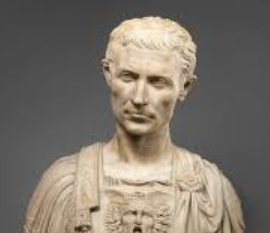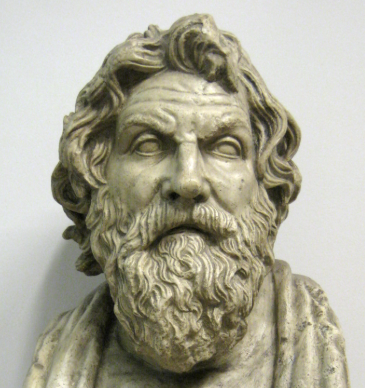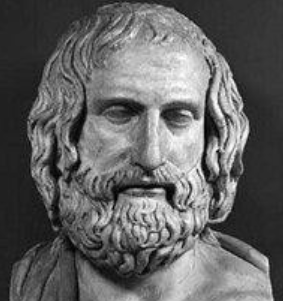
Throw moderation to the winds, and the greatest pleasures bring the greatest pains.
Education is an ornament for the prosperous, a refuge for the unfortunate.
Making money is not without its value, but nothing is baser than to make it by wrong-doing.
If any one hearken with understanding to these sayings of mine many a deed worthy of a good man shall he perform and many a foolish deed be spared.
The right-minded man, ever inclined to righteous and lawful deeds, is joyous day and night, and strong, and free from care. But if a man take no heed of the right, and leave undone the things he ought to do, then will the recollection of no one of all his transgressions bring him any joy, but only anxiety and self-reproaching.
Coition is a slight attack of apoplexy. For man gushes forth from man, and is separated by being torn apart with a kind of blow.
Neither art nor wisdom may be attained without learning.
Now, that we do not really know of what sort each thing is, or is not, has often been shown.
Seek after the good, and with much toil shall ye find it; the evil turns up of itself without your seeking it.
'Tis a grievous thing to be subject to an inferior.
Men in their prayers beg the gods for health, not knowing that this is a thing they have in their own power. Through their incontinence undermining it, they themselves become, because of their passions, the betrayers of their own health.
Now his principal doctrines were these. That atoms and the vacuum were the beginning of the universe; and that everything else existed only in opinion. (trans. Yonge 1853) The first principles of the universe are atoms and empty space; everything else is merely thought to exist.
We should infer in the case of a beautiful dwelling-place that it was built for its owners and not for mice; we ought, therefore, in the same way to regard the universe as the dwelling-place of the gods.
Living virtuously is equal to living in accordance with one's experience of the actual course of nature.
Wise people are in want of nothing, and yet need many things. On the other hand, nothing is needed by fools, for they do not understand how to use anything, but are in want of everything.
He who is running a race ought to endeavor and strive to the utmost of his ability to come off victor; but it is utterly wrong for him to trip up his competitor, or to push him aside. So in life it is not unfair for one to seek for himself what may accrue to his benefit; but it is not right to take it from another.
If I had followed the multitude, I should not have studied philosophy.
If I knew that it was fated for me to be sick, I would even wish for it; for the foot also, if it had intelligence, would volunteer to get muddy.
The universe itself is God and the universal outpouring of its soul.
It is worth observing, how we feel ourselves affected in reading the characters of Cæsar, and Cato, as they are so finely drawn and contrasted in Salust. In one, the ignoscendo, largiundo; in the other, nil largiundo. In one, the miseris perfugium; in the other, malis perniciem. In the latter we have much to admire, much to reverence, and perhaps something to fear; we respect him, but we respect him at a distance. The former makes us familiar with him; we love him, and he leads us whither he pleases.
Bear in mind, that if through toil you accomplish a good deed, that toil will quickly pass from you, the good deed will not leave you so long as you live; but if through pleasure you do anything dishonourable, the pleasure will quickly pass away, that dishonourable act will remain with you for ever.
I will begin to speak when I am not going to say what were better left unsaid.
Nay, men, if any of you had heeded what I was ever foretelling and advising, ye would now neither be fearing a single man nor putting your hopes in a single man.
It is better to fight with a few good men against all the wicked, than with many wicked men against a few good men.
Antisthenes ... was asked on one occasion what learning was the most necessary, and he replied, "To unlearn one's bad habits."
I have enough to eat till my hunger is stayed, to drink till my thirst is sated; to clothe myself withal; and out of doors not Callias there, with all his riches, is more safe than I from shivering; and when I find myself indoors, what warmer shirting do I need than my bare walls? what ampler greatcoat than the tiles above my head?
One should attend to one's enemies, for they are the first persons to detect one's errors.
When he was asked what advantage had accrued to him from philosophy, his answer was, "The ability to hold converse with myself."
There is no work so mean, but it would amply serve me to furnish me with sustenance.
The investigation of the meaning of words is the beginning of education.
Virtue is the same for a man and for a woman.
States are doomed when they are unable to distinguish good men from bad.
To all my friends without distinction I am ready to display my opulence: come one, come all; and whosoever likes to take a share is welcome to the wealth that lies within my soul.
I'd rather be mad than feel pleasure.
As iron is eaten away by rust, so the envious are consumed by their own passion.
It is a royal privilege to do good and be ill spoken of.
Being asked what learning is the most necessary, he replied, "How to get rid of having anything to unlearn.
Once, when he was applauded by rascals, he remarked, "I am horribly afraid I have done something wrong."
Antisthenes ... said once to a youth from Pontus who was on the point of coming to him to be his pupil, and was asking him what things he wanted, "You want a new book, and a new pen, and a new tablet;"
Pay attention to your enemies, for they are the first to discover your mistakes.
Ill repute is a good thing and much the same as pain.
It is better to fall in with crows than with flatterers; for in the one case you are devoured when dead, in the other case while alive.
Wealth and poverty do not lie in a person's estate, but in their souls.
The sun provides the moon with its brightness.
Wrongly do the Greeks suppose that aught begins or ceases to be; for nothing comes into being or is destroyed; but all is an aggregation or secretion of pre-existent things: so that all-becoming might more correctly be called becoming-mixed, and all corruption, becoming-separate.
All things were together, infinite both in number and in smallness; for the small too was infinite.
And since these things are so, we must suppose that there are contained many things and of all sorts in the things that are uniting, seeds of all things, with all sorts of shapes and colours and savours.
Mind is infinite and self-ruled, and is mixed with nothing, but is alone itself by itself.
Thought is something limitless and independent, and has been mixed with no thing but is alone by itself. ... What was mingled with it would have prevented it from having power over anything in the way in which it does. ... For it is the finest of all things and the purest.
CivilSimian.com created by AxiomaticPanic, CivilSimian, Kalokagathia




